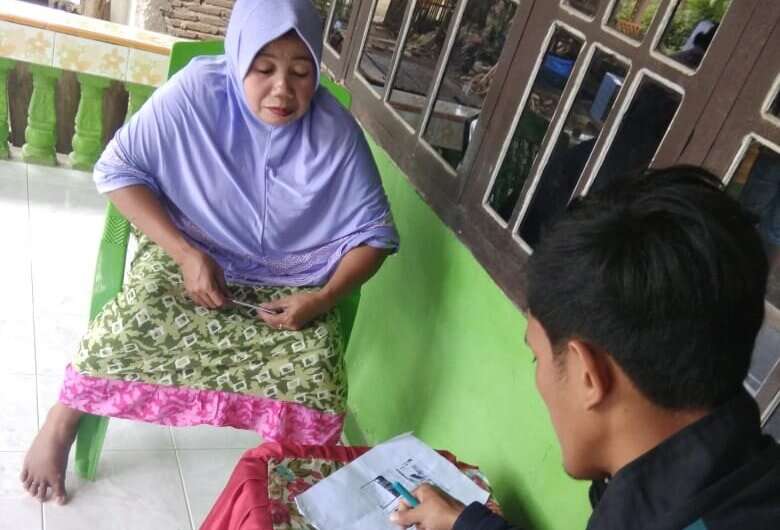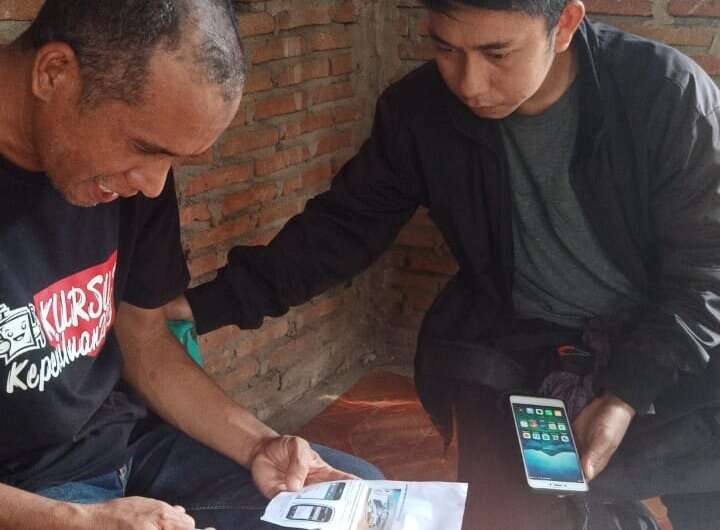A member of the Sulawesi farming community speaks to contact about using a new pair of scissors to prune cocoa crops. Credit: Swisscontact/University of Sydney
When it comes to being an influencer on Instagram and other social media platforms, women rule the roost. But, social media isn't the only domain where women lead—they can also be the drivers of change in their local communities and lead the implementation of new sustainability and development initiatives, according to a new study published today in Agriculture and Human Values.
Led by Associate Professor Petr Matous from the University of Sydney's Faculty of Engineering, the study analyzed the social networks of agricultural communities on the island of Sulawesi, Indonesia to determine which members of agricultural communities could spur change for good, in the context of international development work and sustainability programs.
The researchers conducted a survey of over 2,000 farmers who were asked to identify the most influential opinion leaders in their communities: people defined as those they consulted for advice and information on farming.
The respondents identified eighteen popular opinion leaders, who were then selected for a further experiment where they were asked to convince as many other farmers as possible to improve the health of their cocoa trees with pruning scissors donated by the program. Among these perceived opinion leaders, older males dominated the rankings.
As a comparison, a second group of eighteen farmers was then selected at random, comprising a larger proportion of young farmers and women who had not been selected in the initial survey as agricultural opinion leaders.
Contrary to the researchers' expectations, the second group of farmers convinced twice as many of their peers to trial the new scissors. Among these less-prominent individuals, women and younger farmers were particularly successful at convincing others.
A member of the Sulawesi farming community speaks to their contact about using a new pair of cocoa pruning scissors. Credit: Swisscontact/University of Sydney
"Our result was a real surprise—we didn't originally set out to study the effects of gender or age," said lead researcher Associate Professor Petr Matous, from the School of Project Management and John Grill Institute for Project Leadership.
"But what our result has demonstrated is something often remarked on anecdotally in many other settings. From farming and construction to banking and politics, older men are often perceived as the most influential in their networks, but in our study they didn't have the greatest impact.
The study found that it wasn't always those with the greatest number of social connections that could trigger a large-scale diffusion of change. While the study found women were less likely to be identified by their networks as opinion leaders, their recommendations often led to real action.
"In Indonesia, farming is highly gendered. Few women occupy prominent roles in local farming groups—many of which are community-based organizations aimed at improving the lives of local inhabitants and which often channel support from the government and international organizations," said Associate Professor Matous.
"There were also a number of young men and one older woman who did really well at convincing others to use the scissors. What our result perhaps suggests is that while women and young people don't usually occupy formal leadership positions in their communities and are not typically central to information and resource networks that result from roles like heading a farmer group, they may have other networks that matter, such as more active kinship ties," said Associate Professor Matous.
The social network survey and experiment were organized by Swisscontact, an independent nonprofit organization that has been training cocoa farmers to upgrade their production skills across Indonesia for environmental benefits and reliable yields. Swisscontact mapped farmers' informal information ties to understand the key contacts for disseminating new technology.
The test that was used to determine influential members of the Sulawesi farming community. Credit: Swisscontact/University of Sydney
"We designed the experiment to investigate the importance of perceived influencers in agricultural communities. Working with researchers at the University of Sydney, the results turned our previous assumptions on their head.
"The rural communities we work with are typically traditional, hierarchical, and paternalistic—high status individuals are typically older men. Our program aims to promote diversity and inclusivity, and so we've been looking at ways to include more youth and women in our programs—the study's result strengthens the case for doing so," says Nadya Aulika Runnisa, Swisscontact Indonesia.
Associate Professor Matous said the findings challenged existing gender biases and questioned traditional definitions of leadership and influence.
"We still might need to consult and engage certain locally-respected individuals otherwise we run the risk of them potentially blocking our initiatives. If we want to make change, we need to first recognize the real potential of women and younger participants and then put that into practice."
The research team will gather more data across several countries, with more experiments planned to identify ways to engage local community members in development programs more equitably and with more impact.
More information: Male and stale? Questioning the role of "opinion leaders" in agricultural programs, Agriculture and Human Values (2023). DOI: 10.1007/s10460-023-10415-9
Provided by University of Sydney


























